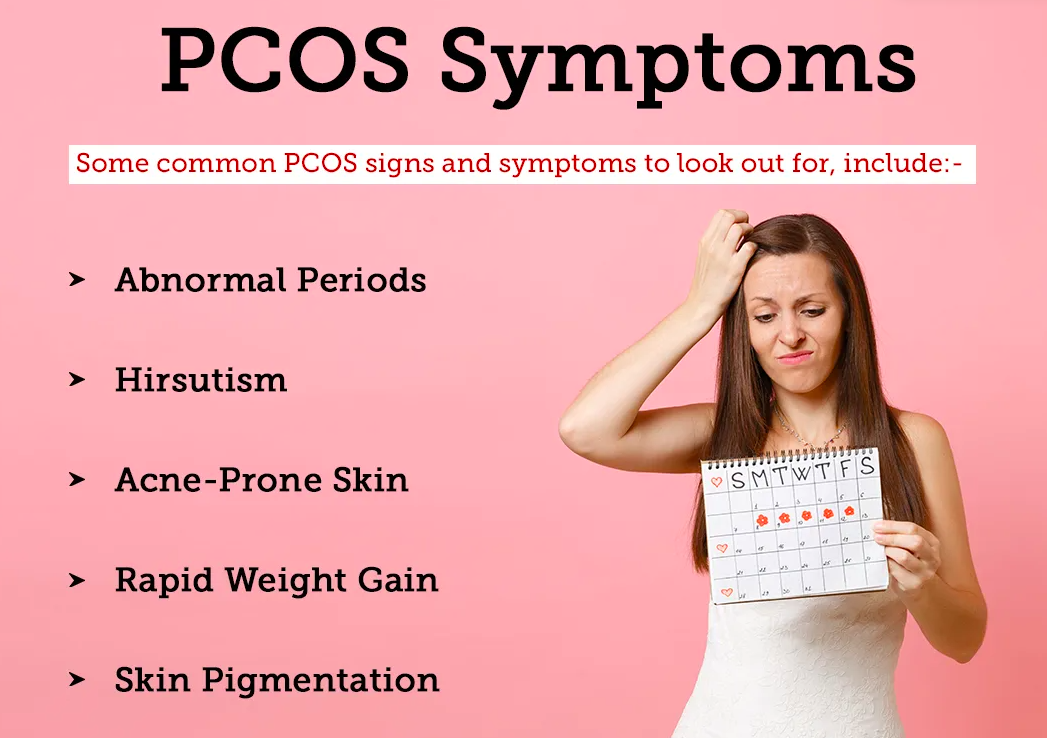What is PCOS?
Polycystic ovarian syndrome (PCOS) is a condition of hormonal imbalances that can affect women and girls of reproductive age.
About 70% of women with PCOS remain undiagnosed in primary care. Abnormal amounts of androgens, male sex hormones and ovarian dysfunction show certain symptoms. These signs diagnose PCOS.

What causes PCOS?
Researchers and healthcare providers say that the exact cause of PCOS is not clear. But they mention that genetic and environmental factors contribute to its development.
PCOS and its symptoms tend to run in families. It’s common for a mother and daughter or sisters to have the syndrome.
Many women with PCOS are also resistant to insulin, which means the body cannot use insulin properly. As a result, insulin levels rise up in the body and cause high androgen levels.
Symptoms of PCOS
Initial signs of PCOS are missed periods, irregular cycles, or very light menstruation. In some cases, people experience heavy, abnormal and prolonged bleeding. Women with irregular menstrual periods have a 91% chance of having PCOS.
High levels of androgens can cause the follicles—small, fluid-filled sacs within the ovaries—to stop developing, causing them to enlarge.
High levels of insulin increase appetite which leads to obesity, making PCOS symptoms worse.
High levels of androgens typically lead to various dermatological symptoms. A rise in insulin levels are the cause of acanthosis nigricans. This is a skin condition where the body develops thickened dark, velvety patches of skin. Androgen imbalance produces excess body hair growth and acne. Women experience male pattern balding as well.
People also suffer from psychological implications such as anxiety and depression. Sleeping disorders are also common.

Do I have PCOS?
There’s no single test to specifically diagnose the syndrome. Your healthcare provider will ask about your medication, medical history and symptoms.
Your provider may also ask about your menstrual cycle and weight changes. You may undergo a physical exam, including the pelvic exam, checking for excessive body hair growth, insulin resistance and acne.
We recommend the following tests:
- Ultrasound. This test checks the appearance of your ovaries and sees if they have cysts. The test can also look at the thickness of the endometrium (lining of the uterus).
- Blood tests. These measure levels of androgens and other hormones. You might also have cholesterol and triglyceride levels checked.
If you are diagnosed with PCOS, your healthcare might recommend further tests. These tests can include:
- Regular checks of glucose tolerance, blood pressure, and cholesterol and triglyceride levels
- Screening for anxiety and depression
Cure for PCOS
Medication cannot cure PCOS. But certain lifestyle changes and medications help reduce symptoms and prevent some health problems.

Lifestyle changes
A balanced diet and exercise can help reduce your symptoms. Losing weight by just 5% can lead to a significant improvement in PCOS. Your diet should include loads of fruits and vegetables, whole foods like wholemeal bread, cereals and brown rice, chicken, fish and lean meat. One should have have 5 portions of meals in a day.
Medicines
You can choose to take medicines on the recommendation of a doctor to treat different symptoms associated with PCOS.
- Contraceptive pills: To induce regular periods.
- Diabetes medication: To treat type 2 diabetes. It can also lower blood sugar levels and insulin.
- Letrozole: To stimulate ovulation.
- A combined oral contraceptive pill: To treat hair loss (alopecia) and excessive body hair growth (hirsutism).
- Medicines are also used to treat other symptoms of PCOS, including weight-loss medicine.
- Birth control pills help you to control menstrual cycles, lower androgen levels, and also reduce acne.
Read more: The Ultimate PCOS Diet Guide for Balanced Hormones and Well-being
Citations
https://orwh.od.nih.gov/sites/orwh/files/docs/PCOS_Booklet_508.pdf
https://www.hopkinsmedicine.org/health/conditions-and-diseases/polycystic-ovary-syndrome-pcos
https://www.nichd.nih.gov/health/topics/pcos/conditioninfo
https://www.mayoclinic.org/diseases-conditions/pcos/diagnosis-treatment/drc-20353443


